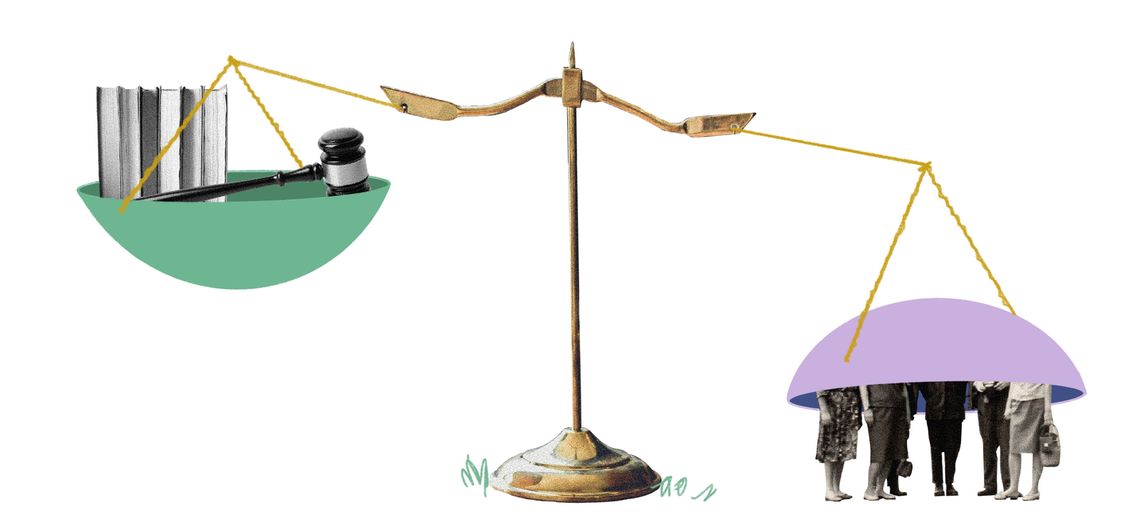

Illustration by Armine Shahbazyan.
“If the Court of Cassation were credible, every single citizen would not have tried to play judge in the cases of Vardan Petrosyan’s accident, Avetik Budaghyan’s murder or Vahe Avetyan’s murder in Harsnakar; instead, they would have awaited the fair verdict of the Armenian court. If the Court of Cassation had been fair, people would not have sought justice in the streets for the increase of transportation prices in Yerevan, the problems of Komitas 5, to stop the illegal construction of the Closed Market, to stop the construction of Marts, Trchkan and other disputed hydropower plants, to defend Tigran Arakelyan, to solve the murder of Lux Stepanyan and other conscripts, or to solve the environmental problems of Teghut.”
Excerpt from the preamble of the Armenian Human Rights Defender’s Special Report (2013) concerning the right to a fair trial.
The effectiveness of the justice system determines the level of respect for human rights within a country, as well as the state’s ability to prevent violations of rights and to restore them.
The concentration of power in the hands of one person leads to catastrophic consequences—arbitrariness, abuse and illegal actions. In the 17th and 18th centuries, English philosopher John Locke and then also French philosopher Charles Louis Montesquieu formulated the theory of the separation of powers, which sought to limit state power through mutual restraint and counterbalancing its divided branches.
The separation of powers into three branches—legislative, executive and judicial—is one of the cornerstones of a democratic state in the modern world. It mitigates the dangers of power centralization and creates the necessary preconditions for the protection of human rights and fundamental freedoms.
The judiciary is a special system called upon to monitor that the state circumscribes its authority over citizens through law, ensuring the protection of human rights. That is why guarantees for the independence of the judiciary and a person’s right to an independent trial are enshrined in international documents, as well as in domestic legal procedures. Moreover, the principles of institutional and individual independence are enshrined in international standards. In particular, institutional independence refers to the independence of the judiciary from the legislative and executive authorities, while individual independence refers to the judges, who must be free and protected from all kinds of pressure when dealing with citizens’ cases.
What kind of courts and judges have we had? Why is it that the reforms of the Armenian judicial system have not produced the desired results, and public trust in that system has always been extremely low?
The Evolution of Armenia’s Judiciary
The process of the formation and reform of the Armenian judicial system began during the very first years of independence. In particular, the first stage of judicial reform began in 1995 with the adoption of the Armenian Constitution, which replaced the Soviet judicial system with a new one. Ten years later, the 2005 constitutional amendments marked the second phase of judicial reforms, during which codes (Criminal Code, Electoral Code, etc.) related to the sphere were adopted. The 2015 constitutional amendments brought in the third phase of the reforms, which emphasized the rule of law and the independence of the judiciary as a constitutional guarantee. Chapter 2 of the Constitution is devoted to the basic rights and freedoms of the person and the citizen. The rights and freedoms set forth therein are recognized as “highest values” and are subject to direct application by the courts.
However, in practice, the reform process that lasted more than two decades did not lead to a systemic transformation, nor in an increase in public confidence in the judiciary, for several reasons. Firstly, the mechanisms for appointing judges were designed so that the ruling party itself determines the composition of the courts, increasing the dependence of judges on the legislative and executive bodies. Appointed for political expediency, and thus constrained, highly vulnerable judges have been forced to serve the interests of the ruling power, failing to administer justice due to their strong dependence on the political class and the private sector. This situation has contributed to a decline in public confidence in the courts.
Let us remember the deaths of servicemen in times of peace and the trials of those cases which did not provide answers or deliver justice, while their mourning mothers dressed in black continuously protested in front of government buildings and the presidential palace for years.
There are also the lawsuits of citizens who had their property confiscated for the construction of Northern Avenue, on which the European Court of Human Rights (ECtHR) expressed its position years later. Such cases have not been few and the public demand for change in 2018 was largely predicated on the imperative of having an independent judiciary. It was this demand for a just society that brought thousands of citizens onto the streets.
The government that was formed after the wave of public protests incorporated certain approaches in its 2019 program. Specifically, according to point 4.1 of the Government’s 2019 Program, the key factor in solving the problem of equality of all people before the law is the political will of the Government, and the most important precondition is an independent, professional and efficient judiciary system. Transitional justice was also included in the 2019-2023 Strategy for Judicial-Legal Reforms, which highlighted the importance of documenting mass, periodical human rights violations in all electoral processes since September 1991, post-electoral political persecutions since September 1991, use of eminent domain, as well as other instances of expropriation, and the cases of military servicemen killed under non-combat conditions.
However, the new government was not able to implement those approaches. It was a major step backwards, in fact, when the Prime Minister even called for a blockade of the courts in May 2019, declaring that “the time has come to carry out surgical interventions in the judiciary.” On the same day, the Prime Minister announced the need to carry out a vetting process for judges, which was forgotten within months and was considered inexpedient.
The process of reforming the justice system in Armenia continues, and if systemic changes are not implemented, it is meaningless to talk about the improvement of the judicial system and restoring public trust. It remains to be seen what steps the new government will take and whether or not the provisions of the strategic judicial reform program will be implemented. However, an independent judiciary is critical to ensuring public confidence in the establishment and restoration of justice, and guaranteeing human rights.
Magazine Issue N8
Civic Culture


In order for a democracy to function properly, it needs a citizenry that participates in civic duties. Civic culture can also be defined as a set of political attitudes, habits and behavior on behalf of citizens who are aware of their political rights and how the decision-making process affects their lives and society. This month’s issue features stories about those rights and responsibilities, including individual awareness, the role of civil society and the role of the judiciary in defending human rights.

